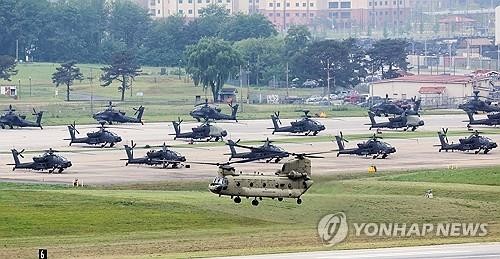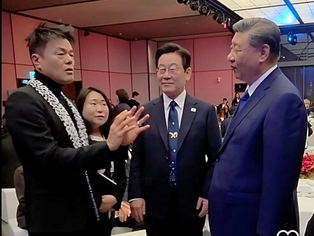 |
| ▲ This photo, taken on May 21, 2024, shows AH-64 Apache helicopters at Camp Humphreys, a sprawling U.S. base in Pyeongtaek, 65 kilometers south of Seoul. (Yonhap) |
Senate-defense policy bill
Senate defense policy bill calls for maintaining USFK troop level
By Song Sang-ho
WASHINGTON, July 17 (Yonhap) -- A Senate defense policy bill for fiscal year 2026 includes a ban on the use of funds to reduce the number of U.S. Forces Korea (USFK) troops below the current 28,500, its text showed Thursday amid concerns that U.S. President Donald Trump's administration could seek a USFK troop cut.
Posted on Congress's website, the Senate bill -- the National Defense Authorization Act (NDAA) -- contains the ban for the first time in five years. It also reaffirms the "sense of Congress" on reinforcing the South Korea-U.S. alliance by maintaining the current USFK troop level.
The bill comes amid speculation that the Trump administration could consider a USFK reduction and call on South Korea to increase its defense spending for its own defense, as Washington prioritizes deterring the "pacing threat" from an increasingly assertive China.
"Amounts authorized to be appropriated by this Act may not be obligated or expended to reduce the total number of members of the Armed Forces permanently stationed in or deployed to the Republic of Korea below 28,500, or to complete the transition of wartime operational control (OPCON) of the United States-Republic of Korea Combined Forces Command from United States-led command to Republic of Korea-led command," the bill read.
But the bill leaves open the door for the use of the funds following the certification that the USFK reduction or OPCON transition is in the U.S. national security interest, and that the action is being undertaken only after appropriate consultations with U.S. allies, including South Korea, Japan and any country that has sent military contributions to the U.N. Command.
The bill affirms the "sense of Congress" that the defense secretary should continue efforts to strengthen alliances and partnerships in the Indo-Pacific, including reinforcing the alliance with South Korea by maintaining 28,500 USFK members.
The prohibition on the use of the funds for the USFK troop cut was included in the NDAA from fiscal year 2019-2021 as Congress moved to prevent any potential unilateral cut during the first Trump administration. But it was dropped later as concerns about the USFK reduction diminished under the former Biden administration that prioritized cooperation with allies.
It is the first time that the bill includes a ban on the use of funds for the completion of the wartime OPCON transfer.
Seoul and Washington have been working on the conditions-based OPCON transfer. Conditions include South Korea's capabilities to lead combined Korea-U.S. forces, its strike and air defense capabilities, and a regional security environment conducive to such a handover.
The issue could emerge as a key alliance issue as the OPCON transfer was among new South Korean President Lee Jae Myung's campaign pledges.
Earlier this week, the House Armed Services Committee passed its NDAA bill that also called for the maintenance of the current USFK troop level.
The defense bill is set to go through a series of congressional procedures, including legislative deliberations and the process of narrowing gaps between the House and Senate and merging their respective versions of the bill.
(END)
(C) Yonhap News Agency. All Rights Reserved























